
Cornish Rex
Cornish Rex
Cornish Rex
Here’s a quiz for you: What animal is known for its slender limbs, small face, and is also called the “greyhound of cats”? The answer is the Cornish Rex! You may not have heard of it before since it’s not often seen in Japan. In addition to having a good style, it also has curly hair as a feature. There are many other secrets about the Cornish Rex hidden on this page. Why don’t you go and explore those secrets right away?
Cornish Rex Basic Infomation
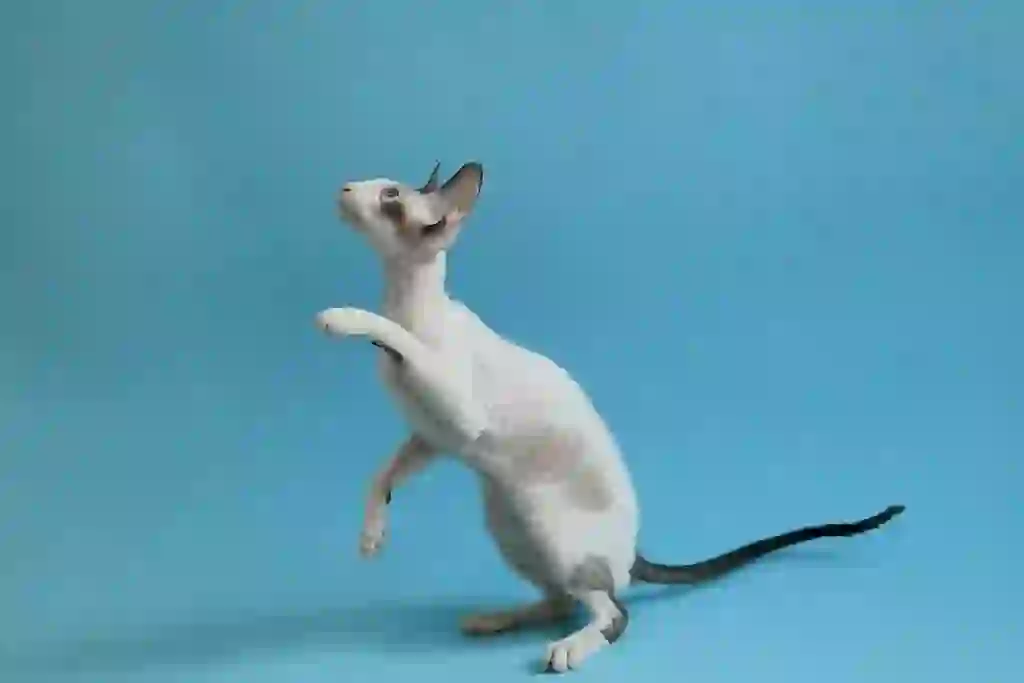
Country of origin United Kingdom.
Weight: 3-4kg.
The Cornish Rex is a cat that was born from a mutation. In 1950, a cat that was kept in a farmer’s house in Cornwall, England gave birth to five kittens.
Among them, one kitten with curly hair was found and named “Kallibunker.” The owner, Nina Enismore, wanted to breed this cat with its unusual appearance, but she couldn’t find the best breeding partner.
Eventually, it seems that planned inbreeding was used to make curly-haired cats more likely to be born. However, in 1956, the breeding costs became too high due to repeated breeding, and the cats had to be released.
Afterwards, the breeding was taken over by a new breeder who attempted to breed not only with inbreeding but also with breeds such as Russian Blue and American Shorthair. However, it was found that curly-haired cats were less likely to be born if one of the parents had straight hair. It seems that the probability did not increase unless both parents had curly hair.
In 1957, it went to America and was bred with slender cats such as Siamese and Oriental. As a result, the current Cornish Rex was completed.
Cornish Rex Q&A

Where does the Cornish Rex get its name?
Named after Cornwall, England, and combined with “Rex,” which means curly hair.

What are the color variations of the Cornish Rex?
Colors for Cornish Rex cats include blue, black, white, red, cream, lavender, and chocolate.
・Solid color. The entire body is a single color.
・Tabby. There are stripes or spots all over the body.
・Silver & Golden. Only the tips of the hair are colored, while the base is white or a light color.
・Smoke & Shaded. The tips of the overcoat are colored, while the rest is white.
・Party color. Two colors are randomly mixed together.
・Calico & Bicolor. Half or one-third of the body is white, while the rest is composed of two or more colors.
・Tabbies & White. Half or one-third of the body is white, while the rest has stripes or spots.
・Pointed. Only parts of the body such as the head, ears, legs, and tail are colored.
・Pointed & White. Parts of the body are colored and mixed with white.
There are blue, yellow, gold, green, hazel and odd-eye.
Cornish Rex cats are short-haired only.
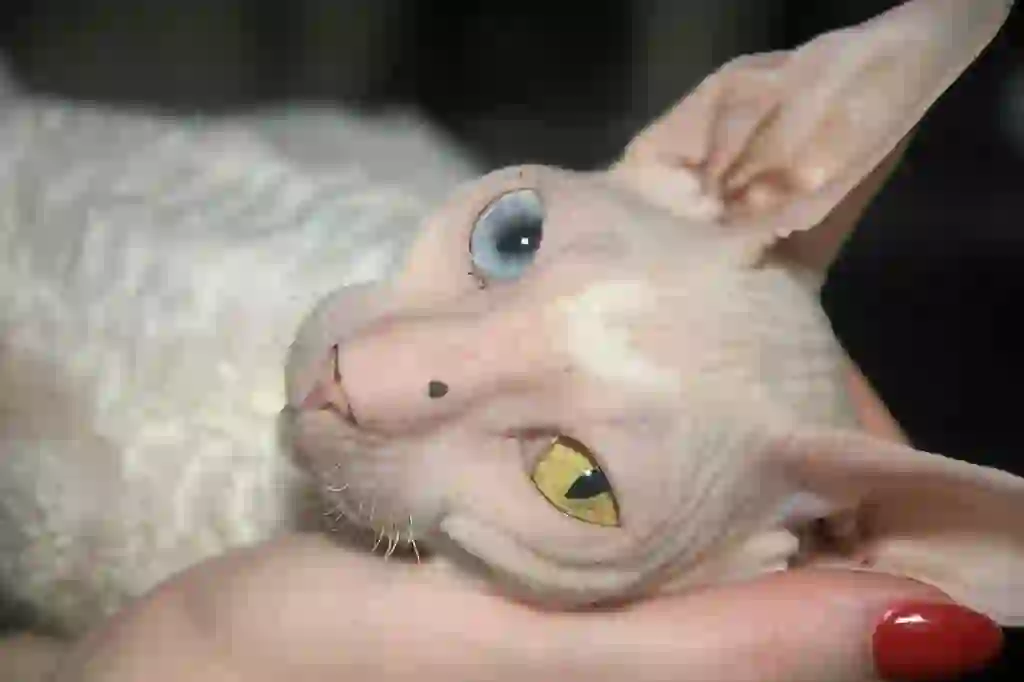
What does a Cornish Rex look like?
Cornish Rex cats have a small, round head with large, egg-shaped eyes. They have a small face but large ears and an Oriental body type. They are slender overall but muscular and have long, slender legs, giving them a sleek body.
Their curly hair is also a charming point. The curls of the Cornish Rex, which have a silky texture, are characterized by being short and curly.
Cats with curly hair like the Cornish Rex have a higher amount of sebum secretion, which requires more frequent grooming than other breeds. Therefore, it is recommended to get kittens used to shampooing and brushing.
However, if you brush them too much, you may lose the important curls of their hair. Therefore, it is best to take care of their fur little by little while watching their condition. Try brushing them several times a week as a basic rule.
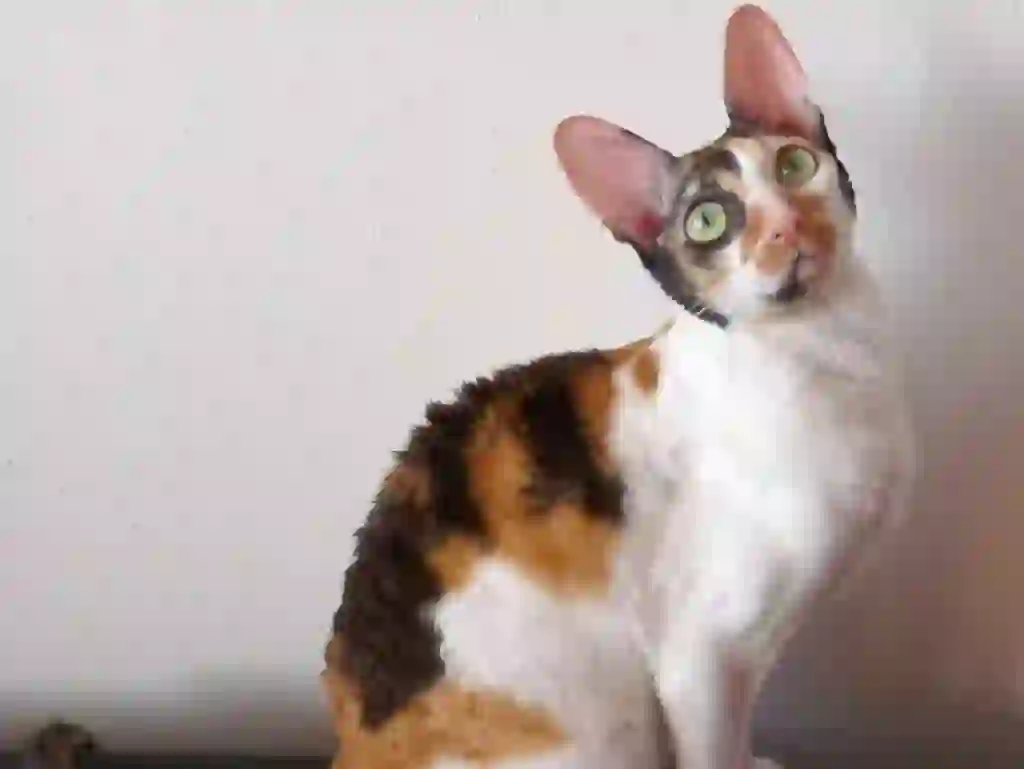
Is it true that Cornish Rex has a curly beard?
That’s right. Although I introduced that their fur is curly, their whiskers are also curly. By the way, the whiskers of other curly-haired cats such as Selkirk Rex and Devon Rex are almost straight, so it’s still unclear why only Cornish Rex cats have curly whiskers.
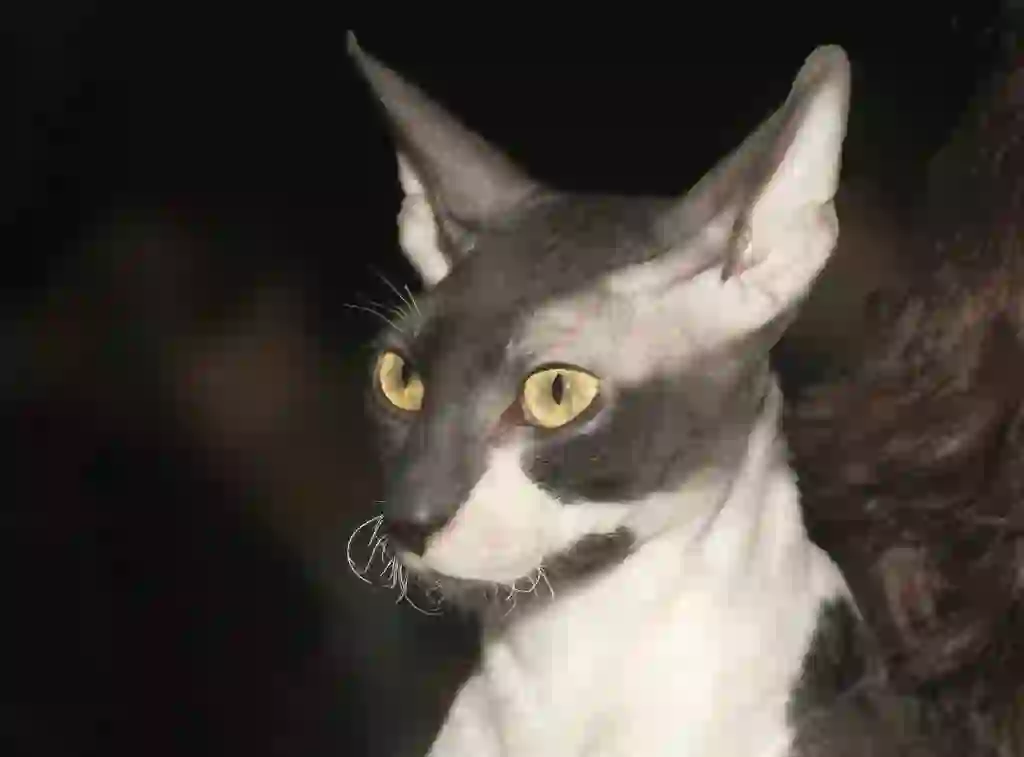
How much does it take to buy a Cornish Rex?
If you want to keep an animal, you need to follow the laws established by each country. This time, I will talk about keeping a Cornish Rex at home in Japan. Cornish Rex cats are still a rare breed in Japan, so they are hardly ever seen in pet shops. Buying from a breeder or cattery is standard, and the price is about 100,000 to 250,000 yen.
The advantage of buying from a breeder or cattery is that you can check points such as what kind of environment the cat grew up in and what kind of parents it has. Also, the reliability varies depending on the personality of the breeder, so it is recommended to make a reservation and visit.
Even with the same breeder, if it is a “cattery,” certification from “CAF” and “TICA,” which are pedigree issuing organizations, is required to be called that. Cats raised in such catteries tend to be more expensive than those purchased from general breeders.
By the way, here are some conditions that cause price differences:
・Being a kitten. ・Having excellent pedigree. ・Having rare colors or patterns.
Although there are other conditions as well, they tend to be expensive if they meet the above conditions.

I want to know more about the personality and traits of Cornish Rex!
Cornish Rex cats love to play with toys and move around, and are often called “dog-like cats” because of their active behavior. They are sociable, so they are good at interacting with people and can often get along with other animals. They also get attached to their owners, so they are perfect for those who want to play with their cats a lot!
Cornish Rex cats are intelligent and easy to train. On the other hand, they have a spoiled side, so they may not be good at being alone for long periods of time. If you have to leave them alone for a long time, it’s best to prepare toys that they can play with alone so that they don’t get lonely.
They don’t like fighting, so they are not very suitable for keeping multiple cats. However, it is not impossible to keep them with other cats, so it is a good idea to determine their compatibility before doing so. From the above characteristics, Cornish Rex cats can be said to be easy-to-keep cats even for beginners.
Cornish Rex cats are said to be a breed that is less likely to cause “cat allergies.” These types of cats are called “hypoallergenic cats,” and Russian Blue and Siberian cats are also members of this group. Since the Cornish Rex has curly hair, which means less hair loss that causes allergy-causing substances, it is less likely to cause allergies.
However, since there are individual differences in whether or not allergy symptoms occur, it cannot be said that it is absolutely safe! It’s more like “less likely to cause allergies compared to other cats.” Therefore, if you have symptoms of cat allergies, it is recommended that you consult a hospital before keeping them. ※If you want to keep an animal, you need to follow the laws established by each country.
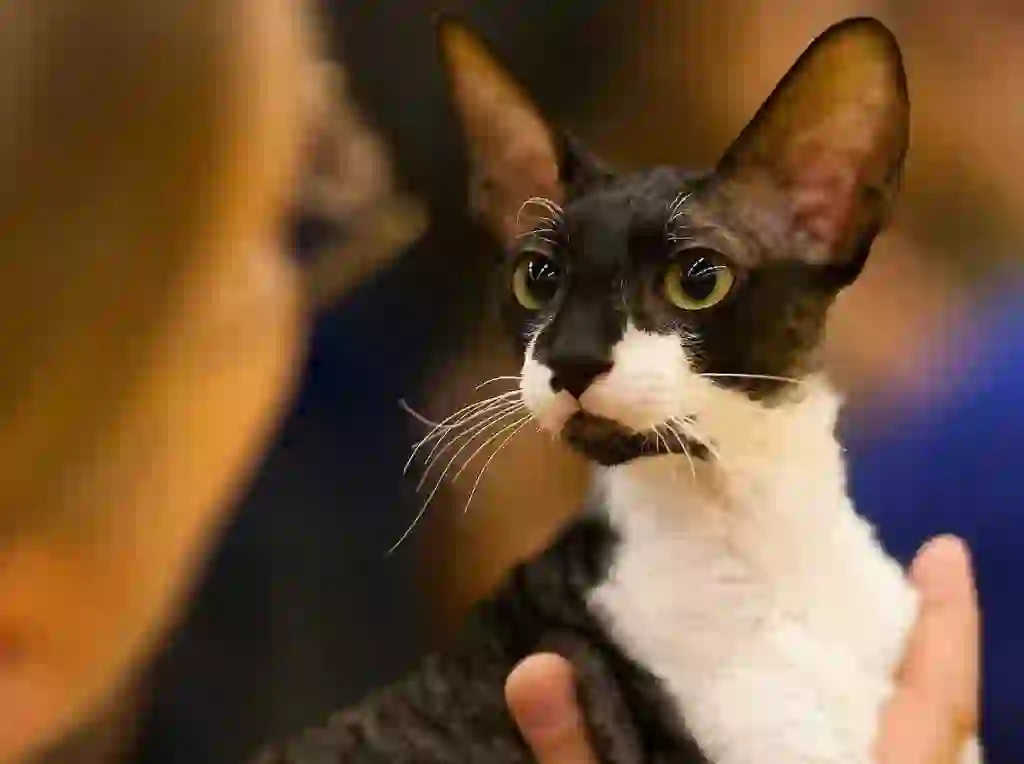
What are the diseases that Cornish Rex is susceptible to?
Cornish Rex cats are prone to “hypertrophic cardiomyopathy,” “skin diseases,” and “lower urinary tract disease.”
This is a disease in which the heart muscle becomes thick, making it difficult for the heart to contract properly. Since it is often caused by genetics, there are no specific preventive measures yet.
Even if there are no noticeable symptoms after the onset of the disease, it may be complicated with thrombosis when noticed, and in the worst case, it may lead to death. So how can we detect the disease early?
In conclusion, it is important to have regular health checkups.
Although there is no groundbreaking treatment for hypertrophic cardiomyopathy yet, slowing down the progression of the disease with symptomatic treatment is possible if detected early.
As I mentioned in the Q&A about appearance, Cornish Rex cats secrete more sebum than other cats, so if left untreated, they may develop skin diseases such as “fungal infections” and “seborrheic dermatitis.” It is a preventable disease by frequent brushing and shampooing, so please take good care of them.
Cats originally do not drink a lot of water due to their history. As a result, they put a burden on their kidneys and often develop urinary tract diseases.
Specifically, there are “urinary tract stones” and “cystitis,” in which stones made in the kidneys become clogged in the urethra or other parts and damage the body’s tissues. If you have symptoms such as a decrease in the number of times you go to the bathroom or blood in your urine or if your urine color is always different, please see a doctor as soon as possible.
Although it is preventable by paying attention to your daily diet and how often you give them water, there are cases where you can still get sick no matter how careful you are. Therefore, it is recommended that you receive regular health checkups if possible.

What is the lifespan of a Cornish Rex?
The lifespan of a Cornish Rex is said to be 12-15 years. The average lifespan of a cat is 12-16 years, so it can be considered average.

Would you like to become a part of the 'Animalbook.jp'?
Turn your knowledge into Q&A and share it with the world. ※Publication will be activated after purchase. Let's share information together!
Cornish Rex Type of List

- Cornish Rex
Information
Congratulations! You are the first commenter!

Create Your Favorite List!
Cornish Rex
Save the animals you love! Build your own list to quickly revisit your favorites later.

Would you like to leave a comment?
※Please note: This is for the purchase of rights to post comments within the article.
Find Your Favorites!
Our shop offers a unique and attractive selection of goods themed around various animals.
Cornish Rex References

- まるごとわかる猫種大図鑑 監修:CFA公認審査員 早田由貴子
- 世界中で愛される美しすぎる猫図鑑 監修 今泉忠明
- The Cat Fancier's Association, Inc. https://cfa.org/cornish-rex/
- 猫との暮らし大百科 https://www.anicom-sompo.co.jp/nekonoshiori/
- みんなの猫図鑑 https://www.min-nekozukan.com/
- Pet Smile news forネコちゃん http://psnews.jp/cat/
- 子猫のへや https://www.konekono-heya.com/sitemap.html
- ねこちゃんホンポ https://nekochan.jp/
- 公益社団法人 埼玉県獣医師会 https://www.saitama-vma.org/topics/猫の遺伝性疾患について/
Cornish Rex Introduction of media used

出典:https://commons.wikimedia.org/wiki/File:Debbiewiki2.JPG

出典:https://commons.wikimedia.org/wiki/File:Olivia2.jpg

出典:https://commons.wikimedia.org/wiki/File:Rex_staredown.jpg

出典:https://pixabay.com/images/id-3770031/

出典:https://pixabay.com/images/id-3770034/

Help Enrich Our Animalbook.jp with Your Media!
We are constantly looking to expand and enrich our Animalbook.jp with amazing photos and videos of animals. If you have any media that you'd like to share, please contribute and help us showcase the beauty and diversity of the animal kingdom. Your submissions will be credited and featured in our encyclopedia, reaching a wide audience of animal lovers.


















